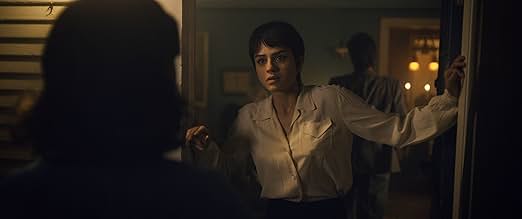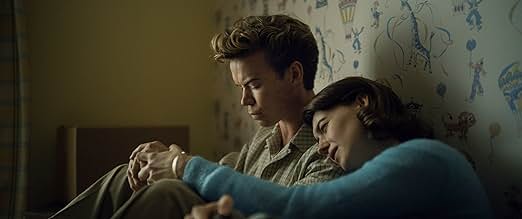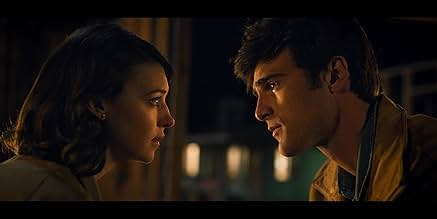Muriel and her husband Lee are about to begin a bright new life, which is upended by the arrival of Lee's brother. Muriel embarks on a secret life, gambling on racehorses and discovering a l... Read allMuriel and her husband Lee are about to begin a bright new life, which is upended by the arrival of Lee's brother. Muriel embarks on a secret life, gambling on racehorses and discovering a love she never thought possible.Muriel and her husband Lee are about to begin a bright new life, which is upended by the arrival of Lee's brother. Muriel embarks on a secret life, gambling on racehorses and discovering a love she never thought possible.
- Awards
- 6 nominations total
Andrew Keenan-Bolger
- Rosie
- (as Andrew Keenan Bolger)
- Director
- Writers
- All cast & crew
- Production, box office & more at IMDbPro
Featured reviews
Rating - 5.4:
Overall, a lackluster, Oscar-bait period drama that is about characters exploring their sexuality in a time when it's taboo, but the movie does so in a surface-level way that provides no nuance to the issue and gives you no material to really care about these characters.
Direction - Pretty Bad: The direction on a macroscale feels very similar to other period dramas like this; the direction on a microscale is pretty lackluster because the actors are giving emotion to material that has no substance or nuance; the storytelling is not good because the movie shallowly discusses the topic and doesn't really provide stakes that engage you
Story - Bad to Pretty Bad: The concept is very surface-level and provides no nuance to these characters exploring their sexuality; the horse-racing storyline is poorly incorporated into the plot; the plot structure follows two parallel stories that intersect at points in the story; the two storylines do not really do a good job exploring the relationships of the characters; character writing is bad because it presents these characters exploring their sexuality in such a surface-level way that provides no nuance to why this was taboo in the 1950s, especially for Edgar-Jones' character
Screenplay - Bad to Pretty Bad: The dialogue provides no substance as it is bland and boring; the symbolism is incredibly surface level and provides no nuance to these characters exploring their sexuality, especially Edgar-Jones' character; the foreshadowing is present
Acting - Pretty Bad: Daisy Edgar-Jones - Pretty Bad (Gives a very surface-level performance; she doesn't really explore the character's sexuality at all and does not really have chemistry with any other characters; In a role that really depends on having good chemistry), Jacob Elordi - Decent (Gives a very surface-level performance; does an alright job exploring the character's sexuality, but it feels very forced and presents no nuance to the relationship's taboo; has alright chemistry with Calva, but very forced chemistry with Edgar-Jones), Will Poulter - Decent (Just a very standard, 1950s husband being cheated on, character; he does not really have chemistry with anyone), Diego Calva - Bad (Feels very forced and does not provide nuance to the character; it has very surface-level chemistry with Elordi), Sasha Calle - Decent to Pretty Good (Probably the best performance for the movie, which isn't saying a lot, because her character is somewhat believable and you can tell the struggle she's going through; she tries to build chemistry with Edgar-Jones, but it isn't reciprocated on the same level), Rest of the cast - Pretty Bad (Just a bunch of formulaic period drama performances)
Score - Decent: Helps set the tone
Cinematography - Pretty Good: The movie is well-shot and feels polished
Editing - Pretty Good: Feels polished and well-edited
Sound - Pretty Good
Visual Effects - Pretty Bad: The fact that they had to CGI the horses shows what is wrong with Hollywood right now
Pacing - Pacing is very slow because it doesn't feel like anything is happening; I would have liked to have seen them add more time to explore these parallel storylines and provide more depth, or just cut one of the storylines altogether
Climax - Climax is decent for how heartwarming it is
Tone - Tone feels like a typical period drama that's Oscar-bait;
Final Notes - Saw the U. S. premiere at SXSW.
Direction - Pretty Bad: The direction on a macroscale feels very similar to other period dramas like this; the direction on a microscale is pretty lackluster because the actors are giving emotion to material that has no substance or nuance; the storytelling is not good because the movie shallowly discusses the topic and doesn't really provide stakes that engage you
Story - Bad to Pretty Bad: The concept is very surface-level and provides no nuance to these characters exploring their sexuality; the horse-racing storyline is poorly incorporated into the plot; the plot structure follows two parallel stories that intersect at points in the story; the two storylines do not really do a good job exploring the relationships of the characters; character writing is bad because it presents these characters exploring their sexuality in such a surface-level way that provides no nuance to why this was taboo in the 1950s, especially for Edgar-Jones' character
Screenplay - Bad to Pretty Bad: The dialogue provides no substance as it is bland and boring; the symbolism is incredibly surface level and provides no nuance to these characters exploring their sexuality, especially Edgar-Jones' character; the foreshadowing is present
Acting - Pretty Bad: Daisy Edgar-Jones - Pretty Bad (Gives a very surface-level performance; she doesn't really explore the character's sexuality at all and does not really have chemistry with any other characters; In a role that really depends on having good chemistry), Jacob Elordi - Decent (Gives a very surface-level performance; does an alright job exploring the character's sexuality, but it feels very forced and presents no nuance to the relationship's taboo; has alright chemistry with Calva, but very forced chemistry with Edgar-Jones), Will Poulter - Decent (Just a very standard, 1950s husband being cheated on, character; he does not really have chemistry with anyone), Diego Calva - Bad (Feels very forced and does not provide nuance to the character; it has very surface-level chemistry with Elordi), Sasha Calle - Decent to Pretty Good (Probably the best performance for the movie, which isn't saying a lot, because her character is somewhat believable and you can tell the struggle she's going through; she tries to build chemistry with Edgar-Jones, but it isn't reciprocated on the same level), Rest of the cast - Pretty Bad (Just a bunch of formulaic period drama performances)
Score - Decent: Helps set the tone
Cinematography - Pretty Good: The movie is well-shot and feels polished
Editing - Pretty Good: Feels polished and well-edited
Sound - Pretty Good
Visual Effects - Pretty Bad: The fact that they had to CGI the horses shows what is wrong with Hollywood right now
Pacing - Pacing is very slow because it doesn't feel like anything is happening; I would have liked to have seen them add more time to explore these parallel storylines and provide more depth, or just cut one of the storylines altogether
Climax - Climax is decent for how heartwarming it is
Tone - Tone feels like a typical period drama that's Oscar-bait;
Final Notes - Saw the U. S. premiere at SXSW.
The adaptation of Shannon Pufahl's novel by Daniel Minahan with a script by Bryce Kass, leaves the feeling of a film that doesn't quite fit together, in which it seems to have good ideas, but not fully developed ones that end up leaving us with the feeling of a film that lacks strength.
With a star-studded cast led by Daisy Edgar-Jones, Jacob Elordi, Will Poulter, and Diego Calva, they are the ones who allow the film to function in terms of intensity, thanks to their solid, dedicated performances. This relationship of indomitable characters is perfectly portrayed by the cast and sustains the weaker moments of the script.
Daniel Minahan's direction is sensual and seductive, complemented by his excellent photography and artistic design, but it is also limited in what his script offers to exploit. We find ourselves with a decent script, but it doesn't explode when it seems it should and feels somewhat chained to the correctness of a proposal that should please everyone, rather than finding its own space and time to invite the viewer to be part of this game of forbidden, seductive, and incorrect romance. Unfortunately, this limitation prevents us from enjoying an intense drama, that of a period romance and the epic of romanticism that is sometimes so lacking in cinema.
What's worth saying is that the film does have a feeling, and it brilliantly applies it to this forbidden love about sexual identity and finding oneself. It's a powerful vision of the fissures that simmer beneath the surface of the United States. It could have been much more intense, but that doesn't mean we're in the presence of an interesting proposal, one that, in its imperfection, hides the old Hollywood cinema it wants to resemble. At times, it succeeds thanks to its star-studded cast, and at others, it remains only with good intentions.
It's a film worth giving a chance to, to bring out your own feelings and emotions.
With a star-studded cast led by Daisy Edgar-Jones, Jacob Elordi, Will Poulter, and Diego Calva, they are the ones who allow the film to function in terms of intensity, thanks to their solid, dedicated performances. This relationship of indomitable characters is perfectly portrayed by the cast and sustains the weaker moments of the script.
Daniel Minahan's direction is sensual and seductive, complemented by his excellent photography and artistic design, but it is also limited in what his script offers to exploit. We find ourselves with a decent script, but it doesn't explode when it seems it should and feels somewhat chained to the correctness of a proposal that should please everyone, rather than finding its own space and time to invite the viewer to be part of this game of forbidden, seductive, and incorrect romance. Unfortunately, this limitation prevents us from enjoying an intense drama, that of a period romance and the epic of romanticism that is sometimes so lacking in cinema.
What's worth saying is that the film does have a feeling, and it brilliantly applies it to this forbidden love about sexual identity and finding oneself. It's a powerful vision of the fissures that simmer beneath the surface of the United States. It could have been much more intense, but that doesn't mean we're in the presence of an interesting proposal, one that, in its imperfection, hides the old Hollywood cinema it wants to resemble. At times, it succeeds thanks to its star-studded cast, and at others, it remains only with good intentions.
It's a film worth giving a chance to, to bring out your own feelings and emotions.
The first thing that doesn't stick at all is the actors' faces and demeanor with the environment and era they are supposed to be living in: their haircuts, makeup and postures are not credible at all.
Then the story is long, slow, and full of slurred speech. Jacob Elordi has the most inexpressive face I have ever seen. Any role in his hands falls flat because for some reason everybody expects his lovely body to compensate for a total lack of acting talent. The only role he played well was the inexpressive, confused teenager in Euphoria.
The result is a flat story that just keeps taking curves here and there without any real depth or emotionality. Flat characters who act out events but can't express the feelings contained in those events.
The end scene is a perfect summary to the whole thing: it is completely unrealistic and ridiculous, much as it tried to be poetic and inspiring.
And I don't like the way they treated the horse at all. The entire horse story is animal abuse.
Really really boring. And almost two hours long!!
Then the story is long, slow, and full of slurred speech. Jacob Elordi has the most inexpressive face I have ever seen. Any role in his hands falls flat because for some reason everybody expects his lovely body to compensate for a total lack of acting talent. The only role he played well was the inexpressive, confused teenager in Euphoria.
The result is a flat story that just keeps taking curves here and there without any real depth or emotionality. Flat characters who act out events but can't express the feelings contained in those events.
The end scene is a perfect summary to the whole thing: it is completely unrealistic and ridiculous, much as it tried to be poetic and inspiring.
And I don't like the way they treated the horse at all. The entire horse story is animal abuse.
Really really boring. And almost two hours long!!
Ever heard the phrase "life's not meant to be managed, it's meant to be lived". I guess this movie shows it's a little bit more complicated sometimes, for some. It's a dance between managing and living. On the one hand everyone's trying to manage what others know about them and on the other hand taking great risks. Living on the edge. One character says that there's always the risk of losing it all. Nevertheless, some brave souls are willing to risk it all. For a chance at love, freedom, pleasure, connection, truth. A chance to be honestly seen and loved.
Is this a great movie? That depends. There are great things about it for sure. The actors for one. The stories told. Fascinating stories of hidden lives, and of secrets. Now exposed to us. Beautiful cinematography! Some shots literally made me want to freeze the frame, take it all in, and then after a long pause, push play.
Is this a great movie? That depends. There are great things about it for sure. The actors for one. The stories told. Fascinating stories of hidden lives, and of secrets. Now exposed to us. Beautiful cinematography! Some shots literally made me want to freeze the frame, take it all in, and then after a long pause, push play.
On Swift Horses is a slow-burning, atmospheric drama about love, secrets, and self-discovery. The film's strength lies in its strong performances and beautiful cinematography, which capture the quiet intensity of the characters' emotions. While the pacing is deliberate and may feel too slow for some, the emotional depth and subtle storytelling make it worthwhile. It's a thoughtful film that lingers after the credits, exploring themes of longing and identity with sensitivity.
Synopsis: Muriel and her husband Lee are beginning a bright new life in California when he returns from the Korean War. But their newfound stability is upended by the arrival of Lee's charismatic brother, Julius, a wayward gambler with a secret past. A dangerous love triangle quickly forms. When Julius takes off in search of the young card cheat he's fallen for, Muriel's longing for something more propels her into a secret life of her own, gambling on racehorses and exploring a love she never dreamed possible.
Synopsis: Muriel and her husband Lee are beginning a bright new life in California when he returns from the Korean War. But their newfound stability is upended by the arrival of Lee's charismatic brother, Julius, a wayward gambler with a secret past. A dangerous love triangle quickly forms. When Julius takes off in search of the young card cheat he's fallen for, Muriel's longing for something more propels her into a secret life of her own, gambling on racehorses and exploring a love she never dreamed possible.
Did you know
- TriviaBased on the novel of the same name by Shannon Pufahl. The character of Muriel (played in the film by Daisy Edgar-Jones) was inspired by Pufahl's grandmother and her experiences in the world of gambling in the 1950s.
- SoundtracksMr. Blue
Written by DeWayne Blackwell
Performed by Loren Kramar featuring Amber Coffman and Zsela
Guitar Solo by Sean O'Brien
Produced by Sean O'Brien
Courtesy of Secretly Canadian
- How long is On Swift Horses?Powered by Alexa
Details
- Release date
- Country of origin
- Language
- Also known as
- Hızlı Atlar Üzerinde
- Production companies
- See more company credits at IMDbPro
Box office
- Gross US & Canada
- $1,030,558
- Opening weekend US & Canada
- $542,360
- Apr 27, 2025
- Gross worldwide
- $1,174,247
- Runtime1 hour 59 minutes
- Color
Contribute to this page
Suggest an edit or add missing content





































